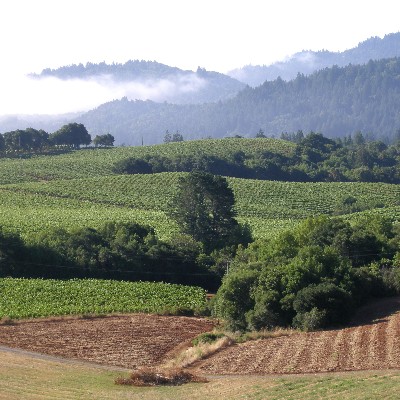News from Amista Vineyards
Does Amista Vineyards Make Vegan Wines?
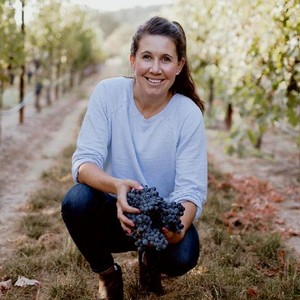 Yes! Since 2014, every wine in the Amista collection is vegan.
Yes! Since 2014, every wine in the Amista collection is vegan.
Sonoma Tourism recently published an article showcasing some of the vegan wineries in Sonoma County. It explains that “Historically, and this is largely still true present day, the process of fining and filtering wines always involved the use of fining agents that included animal ingredients. There’s nothing unusual about these ingredients in winemaking, and these fining and filtering methods are still prevalent in most commercial wine-producing regions around the world.”
What Are Fining Agents?
Fining agents are used to clarify and polish the wines to remove the small particles and sediment. The agents bind with the particles making them large enough to filter out of the final wine. They are completely removed before the wine is bottled, but the fact that animal derivatives were used in the winemaking process means the wines cannot be considered vegan.
Does Amista Use Fining Agents?
In the early years, like most wineries, we used fining agents for some of our wines. Since Ashley Herzberg joined as winemaker in 2011, all our wines have been vegan, except one where she used egg whites as a fining agent. That wine was vegetarian but not vegan.
Amista - Vegan Wines, Organically Farmed
Now all our wines are vegan. This is only one part of our commitment to make our winemaking process more natural, as the article explains:
“All of Amista Vineyard’s wines are vegan, as a result of the winery’s focus on minimal-intervention winemaking practices. No fining agents are added to Amista’s wines. Instead, the focus is on keeping wines in balance naturally, through close attention to the vineyard, pressing choices, and skin contact time.
Amista’s vineyards are farmed organically, the property is free of herbicides and glyphosates, and the vineyards are certified as Fish Friendly and Sustainable.”
Today, there are more and more wineries in Sonoma County that craft vegan wines. Check out Sonoma County Vegan Wineries for a diverse list of wineries from all parts of Sonoma County. Yes, we have something for everyone!
When you come, we invite you to Taste with Us at Amista Vineyards in the heart of Dry Creek Valley, just outside the town of Healdsburg. We specialize in estate grown, Methode Champenoise sparkling wines and Rhône varieties. Soak up our gorgeous vineyard and valley views and experience a friendly Amista welcome (Amista means “making friends” in Spanish).
Need Your Sparkling Wine Fix? Amista Vineyards is a A Must in Dry Creek Valley
Dry Creek is a jewel in the crown of the Golden State according to Allison Bailin Batz in her recent article for FabulousCalifornia. “As one might expect, the best adventures in Dry Creek are centered around wine,” says Batz. She’s right!
In addition to incredible wines, Dry Creek serves up beautiful vistas, acres of vineyards, and a friendly, laid-back atmosphere. Did you know we have just two roads, two stop signs, and no traffic lights in Dry Creek Valley? You’ll be among the vines surrounded by tree-studded hillsides, yet only a few minutes from the charming town of Healdsburg.
Favorite Wineries in Dry Creek Valley
Tasting marvelous wines is the reason to visit Dry Creek. Batz shares a list of her favorites. We are honored to be on the list with some of our own favorite winery neighbors. Here’s what she says about Amista:
“This small, family-owned winery is a must if you need to get your sparkling wine fix. There is a splendid winery walk you can take by reservation that showcases their sustainable farming practices and gives a behind-the-scenes look at how they succeed at making Rhône varietals in the heart of California.”
Even though she narrowed down her list of wineries from 80 to 12 of her favorites, you may need more than a weekend to check them out!
Local’s tip: be sure to have some food as you venture out wine tasting. You can pick up sandwiches or deli items on your way into Dry Creek at Big John’s, our incredible local market, or pop into the historic Dry Creek General Store for takeout sandwiches and salads. Or you can order a cheese and charcuterie board when you visit us at Amista!
Where to Dine in Healdsburg During Your Visit
“Oh, we are not done yet! You cannot leave Dry Creek without checking out at least a few of the lauded restaurants and bars,” adds Batz. Totally agree and she has some of our favorites on the list. We also love Baci Café and Wine Bar, Campo Fina and Willi’s Seafood. You’ll need a place to stay while you’re in Healdsburg, and we have some nice ones. The article showcases several terrific boutique hotels.
Check out A Weekend in…Dry Creek Valley by Allison Bailin Batz in FabulousCalifornia.
Get Your Sparkling Wine Fix!
Need your sparkling fix? Come taste with us. We have estate grown, Methode Champenoise sparkling wines and Rhône varieties paired with a friendly Amista welcome.
Secrets of the Amista Wine Tasting Barn
A Beautiful, Energy Efficient, Solar Powered, Wine Tasting Space with a Secret Welcome Sign
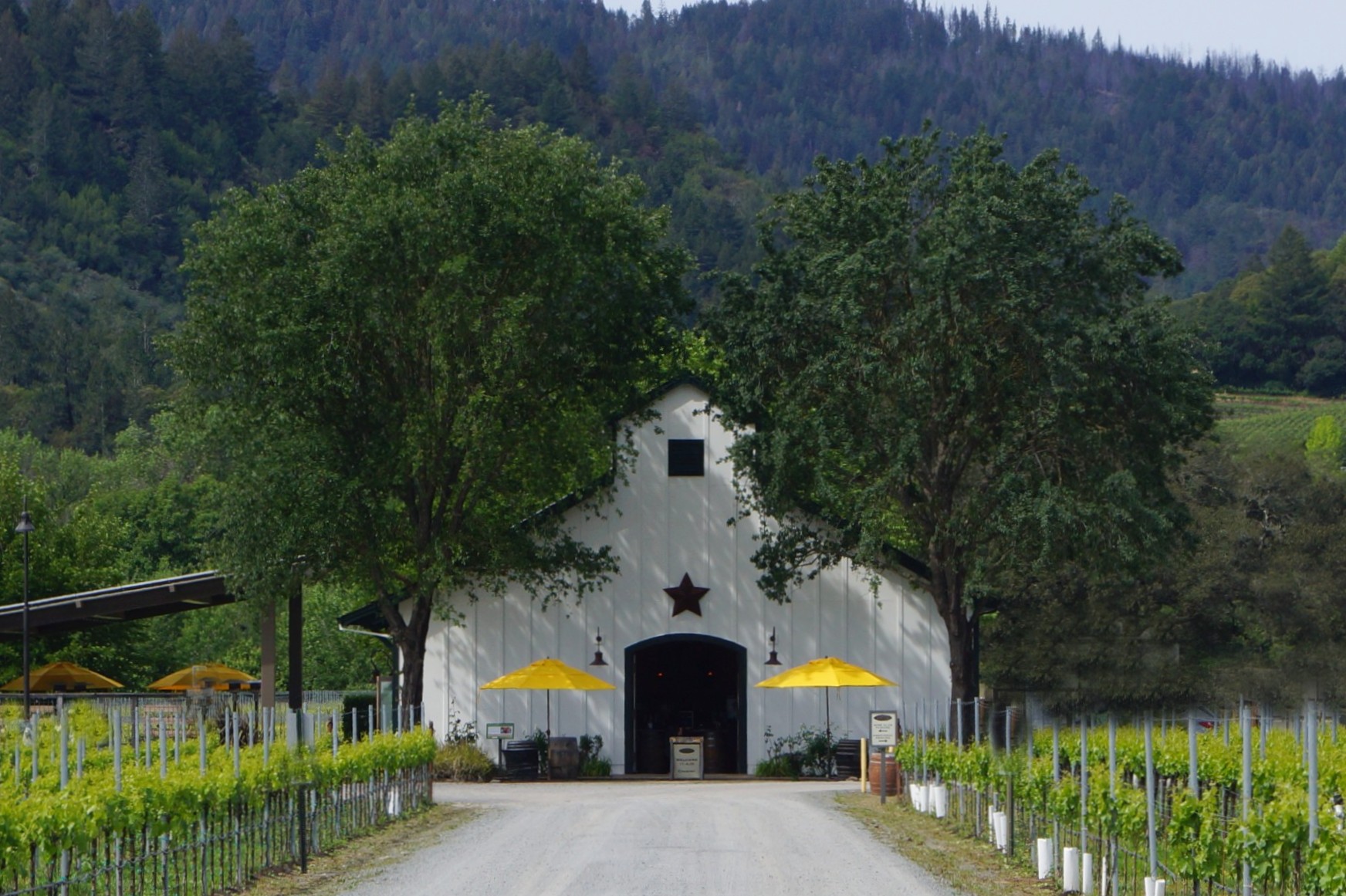
Five secrets revealed...
Painting it White
Paloma Blanca has arrived at Amista Vineyards! That’s the name of the new color we painted our barn, which means White Dove. Gone is the sage color that made the building melt into the many shades of green on the hillsides behind it. I secretly wanted to keep it that way. I liked the fact that it blended into its environment. Brian, our estate director, had another idea. His vision was to create a modern farmhouse look. He was right. It provides a stunning backdrop for the indigenous Valley Oaks that frame the barn and our hallmark yellow umbrellas. It looks fresh; it pops; it’s beautiful!
Creating a Place for Wine Tasting in Mike's Dream Winery
If our barn could talk, it would reveal a lot of secrets. Like the fact that it was originally designed to be a production facility. It has a concrete pad for crushing grapes. It has a big roll-up door on the “crush pad” side and huge double doors in the front that are sized for a forklift. It has a little back room that was supposed to be the lab, a drain running down the middle of the floor and a wine production-size septic system. It has lots of windows in the clerestory that were intended to bring natural sunlight into the production area. It was Mike’s dream winery.
About halfway through the construction, I told him I thought it had a higher purpose. Since our property is in the very heart of Dry Creek Valley and only three miles from the charming village of Healdsburg, I wanted the entire building to become a tasting room. I figured we already had a place to make our wine at a local custom crush facility, but we desperately needed a place to sell it. And we needed a place to welcome guests and host our wine club members.
Without a tasting room, we had come up with the idea of hosting tasting parties in the homes of friends all over the Bay Area. The parties were a big success. We had fun telling our story in a casual setting, met a lot of new people, sold a lot of wine, and signed up a lot of club members. On the other hand, driving for two hours, hosting a party, and then driving home at night made for a long day. Plus, we couldn’t even have a glass of wine with our new friends since we had to drive back home. It was not a long-term solution. And that’s the story of how Mike’s dream winery became a tasting room. He’s always been a little sad about it, mostly because he never got his forklift!
Building an Energy Efficient Building
Another secret the barn would reveal is that is constructed of ICF blocks and the walls are a foot thick. ICF’s or insulated concrete forms, are blocks with two layers of thermal insulation with space in between to fill with concrete. They are assembled as interlocking modular units that are dry stacked without mortar. The units lock together something like Lego blocks. Once the blocks reach a certain height, they are filled with concrete. The process is repeated until the full height of the building is achieved. The forms stay in place providing both insulation and strength.
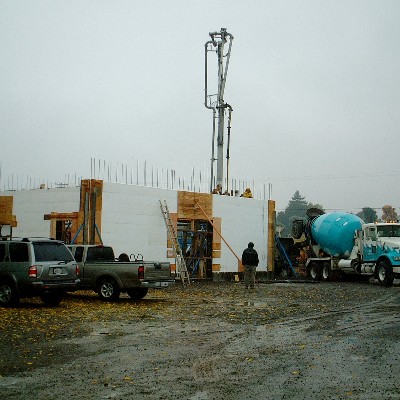 ICF’s are more energy-efficient than most construction materials resulting in energy savings and reduced environmental impact. The thick, steel-reinforced concrete walls also protect against fires and earthquakes. Because of the energy efficiency of the walls and the carefully designed system that blows warm air out from vents at the top of the clerestory and draws cool air into the vents near the floor at night, there is no need for air conditioning. Of course, you must keep all the doors closed on warm days for this to work properly – a concept that would have been perfect for a production facility but maybe not so great for a tasting room where everyone wants to see the view!
ICF’s are more energy-efficient than most construction materials resulting in energy savings and reduced environmental impact. The thick, steel-reinforced concrete walls also protect against fires and earthquakes. Because of the energy efficiency of the walls and the carefully designed system that blows warm air out from vents at the top of the clerestory and draws cool air into the vents near the floor at night, there is no need for air conditioning. Of course, you must keep all the doors closed on warm days for this to work properly – a concept that would have been perfect for a production facility but maybe not so great for a tasting room where everyone wants to see the view!
Adding Solar at Amista
And the view is truly worth seeing – lush vineyards in the foreground with a backdrop of tree-studded hillsides revealing multiple layers and shades of green. People gravitated to the outdoor space, so we put up a large white tent to protect them from the sun.
The tent provided shade for over ten years, but I’m sure that our energy efficient barn secretly yearned for a more suitable partner. In 2020 we finally built a patio with a shade structure entirely covered in solar panels. We also added panels on the south-facing roof of the barn. The new solar system powers the tasting room, our home and all the wells on the property.
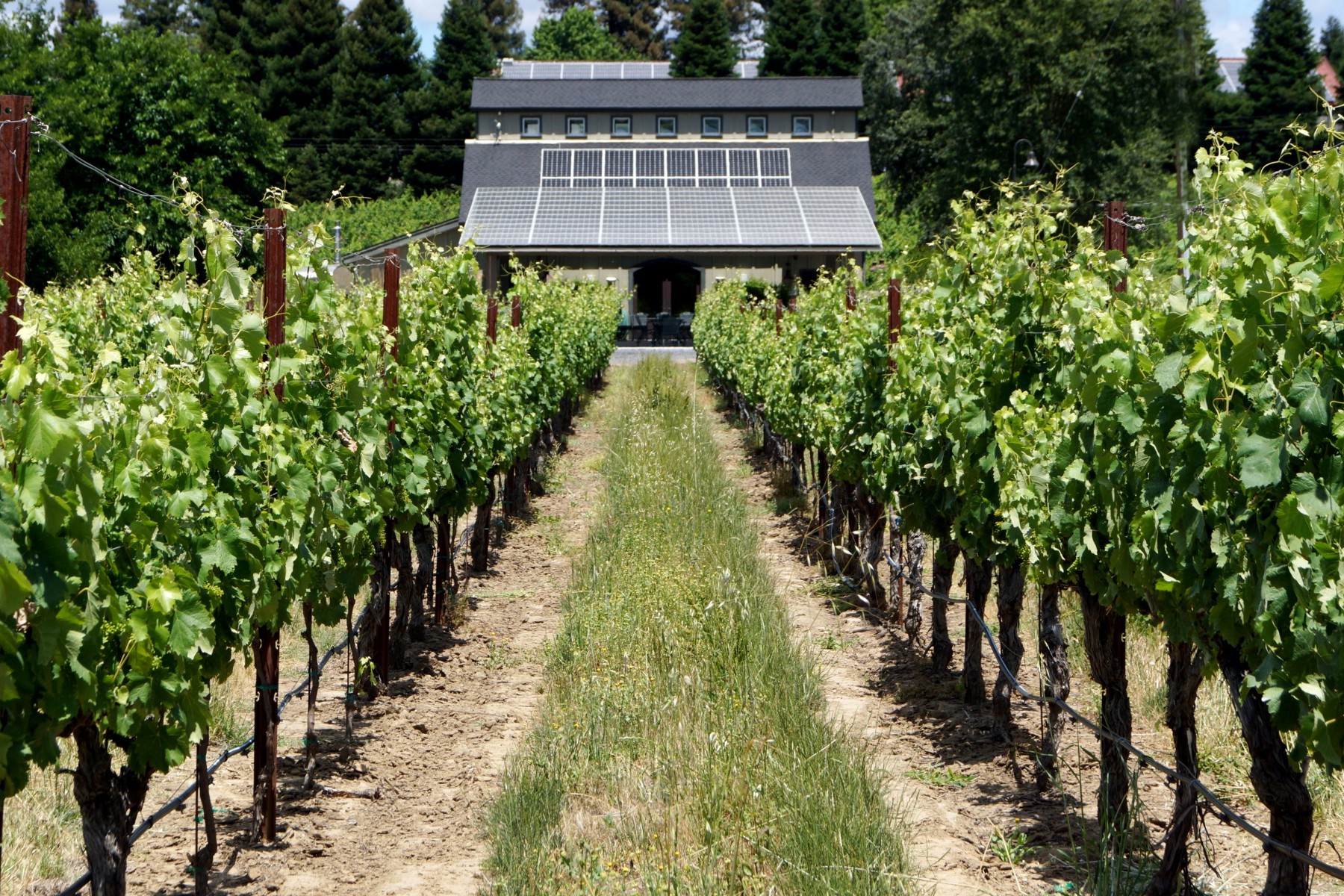
I wonder if the barn carries the secret of who came onto the property in the middle of the night and stole two tons of Mourvèdre grapes that were almost ready to harvest. But that is a story for another time!
Revealing the Secret Amista Welcome Sign on the Door
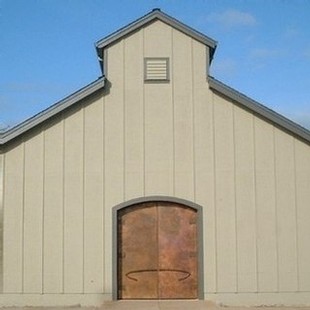 Our barn was completed in 2007, making it 15 years old. I wonder what other secrets it holds. It has certainly had its share of wonderful people coming through its massive copper (on the outside) and brass (on the inside) double front doors. The doors were a gift from my mother, designed and crafted by an artisan blacksmith in Berkely, California. The handles on the outside are in the shape of what I call the Amista “swoop”, that surrounds the word Amista on our logo. The swoop represents arms opening, the perfect sign of welcome to Amista, which means making friends in Spanish.
Our barn was completed in 2007, making it 15 years old. I wonder what other secrets it holds. It has certainly had its share of wonderful people coming through its massive copper (on the outside) and brass (on the inside) double front doors. The doors were a gift from my mother, designed and crafted by an artisan blacksmith in Berkely, California. The handles on the outside are in the shape of what I call the Amista “swoop”, that surrounds the word Amista on our logo. The swoop represents arms opening, the perfect sign of welcome to Amista, which means making friends in Spanish.
One thing that is not secret is that the barn is the perfect setting for meeting new guests from near and far. It is the place where we welcome our members “back home to Amista”. It is where we share delightful wine club celebrations, tastings, and dinners. And it is the "work home" for all the special people who are or have been members of our Amista team over the years.
If you’ve been before, come see us all dressed up in our new Paloma Blanca. If you haven’t, you’re invited to come taste with us and experience the warm welcome and gorgeous views for yourself.
